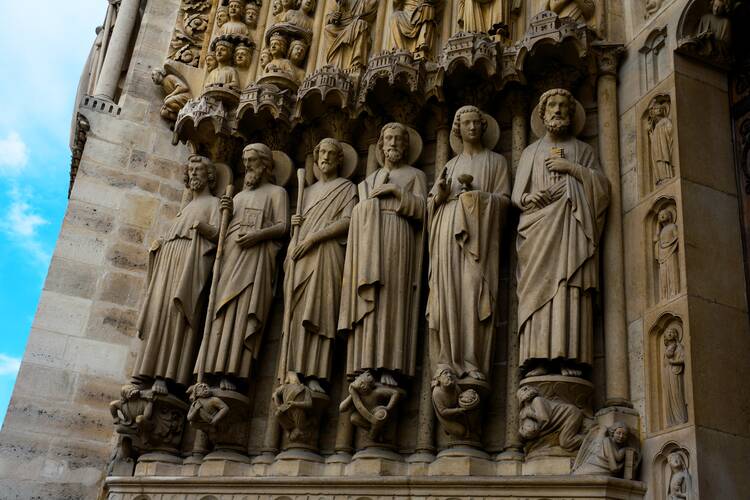A Reflection for the Solemnity of All Saints
Find today’s readings here.
“These are the ones who have survived the time of great distress; they have washed their robes and made them white in the Blood of the Lamb.” (Rv 7:14)
In grade school, my public speaking teacher and religion teacher collaborated every year to put together my school’s annual 4th-8th Grade Saints Presentations. Two girls from each grade would be chosen to read their speeches in persona sancti, and choices ranged from St. James to St. Elizabeth of Hungary to then-Bl. Kateri Tekakwitha.Rather than dressing up in the Halloween costumes you might expect, we dressed up as the saints on whom we had written reports in the weeks before. It, along with the many other traditions of my tiny school, was very different from the Halloween experiences of my neighbors who went to public school.
The saints I chose each year had a few similarities with each other: young girls, usually ancient Roman, and usually martyred or somehow violently harmed before death—I promise, I was a well-adjusted child; I just thought their stories were fascinating, especially since they were close to my age at the time of their deaths. (It also meant that their stories were nothing if not poorly documented.) But looking back on that, I can either see my need to make things difficult for myself with little information to research, or note the profound statement that my choice of these women makes about Catholic sainthood.
Today, we pray to all the saints—but I think we can remember in a special way the littlest ones, who don’t make huge structural changes in the church, who survive the time of great distress.
In the first reading today, we hear about the great multitude praising God whom John sees in Heaven. “They are the ones who have survived the time of great distress,” the elder tells him. The “time of great distress,” at least for St. Agnes and St. Philomena and St. Maria Goretti, is the harrowing time before their deaths, when they were raped or scourged or tortured. The “great distress” for us most likely and hopefully doesn’t include this violence, but we have other distress in our lives today that we must overcome, often in political and social realms. It’s difficult to live as we’re instructed to do in the Gospels, even more so to do it as consistently as the saints did.
Even though the saints I chose made the impossible decision to remain faithful to God in the face of such torture, they weren’t powerful in any other way. They had no authority over the church, a religious community, or even their own household. The simple faith and powerlessness of saints like these is something I try to remember on All Saints Day—they weren’t famous or influential in their time, just like most of us.
Today, we pray to all the saints—but I think we can remember in a special way the littlest ones, who don’t make huge structural changes in the church, who survive the time of great distress.








